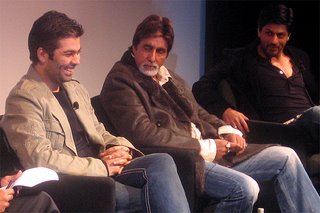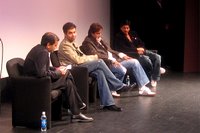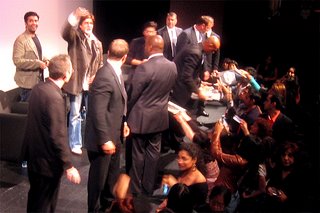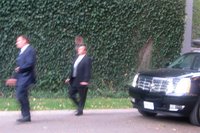 "I touched him!!!" screamed a young South Asian girl and the gaggle of friends around her screamed. "Oh my god, you touched him!" they said over and over, on the verge of tears. The scene: near Roy Thomson Hall, moments after my last post. I was running past at breakneck speed and it was a perfect audio snapshot of what was to come. The man of their dreams was none other than rakish Shah Rukh Khan, India's answer to... well sort of Tom Cruise crossed with Harrison Ford, but really neither. Really a category of his own. He leaps off the screen in the lead role of Never Say Goodbye larger than life in a way that actors rarely are in Hollywood.
"I touched him!!!" screamed a young South Asian girl and the gaggle of friends around her screamed. "Oh my god, you touched him!" they said over and over, on the verge of tears. The scene: near Roy Thomson Hall, moments after my last post. I was running past at breakneck speed and it was a perfect audio snapshot of what was to come. The man of their dreams was none other than rakish Shah Rukh Khan, India's answer to... well sort of Tom Cruise crossed with Harrison Ford, but really neither. Really a category of his own. He leaps off the screen in the lead role of Never Say Goodbye larger than life in a way that actors rarely are in Hollywood. On screen, his character Dev leads the movie with one of its best scenes. Sliding on to a park bench beside an uncertain runaway bride, he convinces her she has to go through with it - impishly, sarcastically, with resignation to her fate on her behalf. Then, walking away from her, he realises she has hit him like a ton of bricks. In turning to look at her one last time, he gets hit by a car and his career in soccer is over. These are the tragic tones that kick off the melodrama that is the story's axis. Who cares? It's Bollywood, of course it's melodramatic! It wouldn't work if it wasn't.
Later in the day, at a Mavericks session at the Isabel Bader Theatre, the legendary Amitabh Bachchan commended Shah Rukh Khan's performance by saying he had managed to 'relieve himself' of any negative opinion the actor might have of the way the character was behaving by adopting such a cynical, sarcastic manner. In other words, by making Dev both endearing and contemptible, he allows him to be more fully human and takes himself off the hook of social responsibility for the role. Interesting dynamics! Do you think a North American actor worries this way about who they play?
 The two events were a mob scene. During the introductions at Roy Thomson Hall, the place erupted in fireworks -- and the cheering and shouting that met Bachchan's entrance on stage would put Justin Timberlake to shame. Pretty good for a man in his 60s. Director Karan Johar, debuting his third feature, was confident and reverent of the talent established around him. All three men spoke in both places about their deep reverence for the institution of marriage, but that some issues need to be addressed. When I first heard this at Roy Thomson Hall, given their gravity, I assumed there was a gay storyline somewhere in the movie. But what they were referring to was divorce, still a difficult subject for many South Asians.
The two events were a mob scene. During the introductions at Roy Thomson Hall, the place erupted in fireworks -- and the cheering and shouting that met Bachchan's entrance on stage would put Justin Timberlake to shame. Pretty good for a man in his 60s. Director Karan Johar, debuting his third feature, was confident and reverent of the talent established around him. All three men spoke in both places about their deep reverence for the institution of marriage, but that some issues need to be addressed. When I first heard this at Roy Thomson Hall, given their gravity, I assumed there was a gay storyline somewhere in the movie. But what they were referring to was divorce, still a difficult subject for many South Asians. The movie takes place in New York city but almost all the faces we see are South Asian. It is a wonderful inverse of the usual reality: white folks making movies in India on Indian themes where the key characters speak in English. Remember Gandhi? The white people here all seem very white - as if Johar wanted to point up the contrast. On this level alone, it is an unusual take on the Big Apple. But it is also strangely modern in a way that is provocative of the genre. The characters have more complex experiences with each other than one would expect. Which makes the contrast of the music and dance numbers (which are spectacularly superficial) all the more vivid. Still, who cares? Watching India's hottest stars dance and sing and gyrate up a storm, flanked by colourful gorgeous dancing people, who wants depth?
The movie takes place in New York city but almost all the faces we see are South Asian. It is a wonderful inverse of the usual reality: white folks making movies in India on Indian themes where the key characters speak in English. Remember Gandhi? The white people here all seem very white - as if Johar wanted to point up the contrast. On this level alone, it is an unusual take on the Big Apple. But it is also strangely modern in a way that is provocative of the genre. The characters have more complex experiences with each other than one would expect. Which makes the contrast of the music and dance numbers (which are spectacularly superficial) all the more vivid. Still, who cares? Watching India's hottest stars dance and sing and gyrate up a storm, flanked by colourful gorgeous dancing people, who wants depth?Bachchan plays "Sexy Sam", a playboy who nonetheless resonates more deeply held values. As such he is a cross between eastern and western cultures: dangling young women on his arm and joking about how casual his encounters with them are, but at the same time raising an eyebrow at the extra-marital affair of his son's wife. It is not meant to be a double standard for men and women but a reflection of Indian culture. The movie treats both the man and the woman (our lead characters) as equally at risk/blame in the situation. And maybe for that alone it is a bit avant-garde.
At the Mavericks session, the security was intense. White suits flanked the stage area (see picture) and were always on view, always nearby. Besides being the "star of the millenium" (according to a recent Variety poll), Bachchan has also been a politician and is a friend to the Gandhi family. Families and dynasties figure big in this world. Driector Karan Johar grew up next to Bachchan's home and played with his son, Abhishek Bachchan, who plays Sexy Sam's son in the movie. One can't help wonder if he could have made three feature films by his thirties if he had grown up in another neighbourhood.
The three men spoke avidly about the need for stronger writing in Indian features (we learned that 'Bollywood' is actually a bit bourgeois as a term among those who work in that industry. It presumes that Hollywood came first, when Indian filmmaking was already in progress by 1897.) Johar told us that many new genres are being offered now in Indian cinema as well (he wants to make a thriller next) and therefore there is much more scope and possibility for superior screenplays. Bachchan offered the explanation that not much good new writing is coming out of the Hindi language, that it is perhaps a dying form. Johar confessed that he writes his screenplays in English and then has them translated into Hindi. He also writes lots of dialogue in Hindi but always needs to work it a bit with a Hindi dialogue coach. All three men longed for a resurgence in the Hindi language so that a new generation can use cinema more fully to express itself.
 When the time came to leave, there was pandemonium again. Outside, I was nearly knocked down by two people trying to outrun the three black SUVs and black town car and seven walking security men who were flanking the gentlemen's exit. After they had passed, a man took a picture of his family standing in front of where the cars had been. Momentarily real, the movie men were quickly returned to the elusive stuff of dreams, where I guess all stars live in the minds of their fans.
When the time came to leave, there was pandemonium again. Outside, I was nearly knocked down by two people trying to outrun the three black SUVs and black town car and seven walking security men who were flanking the gentlemen's exit. After they had passed, a man took a picture of his family standing in front of where the cars had been. Momentarily real, the movie men were quickly returned to the elusive stuff of dreams, where I guess all stars live in the minds of their fans.
No comments:
Post a Comment